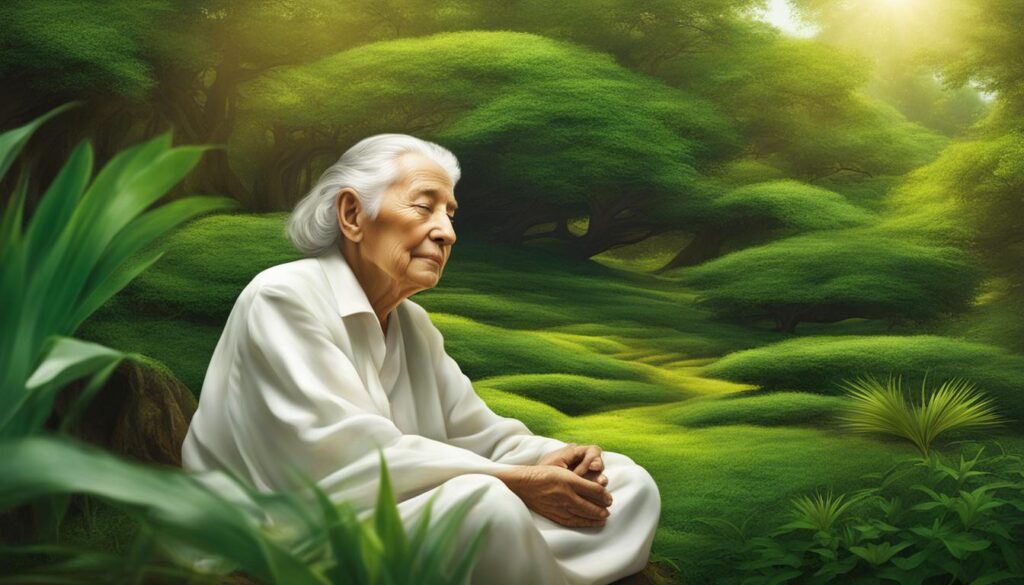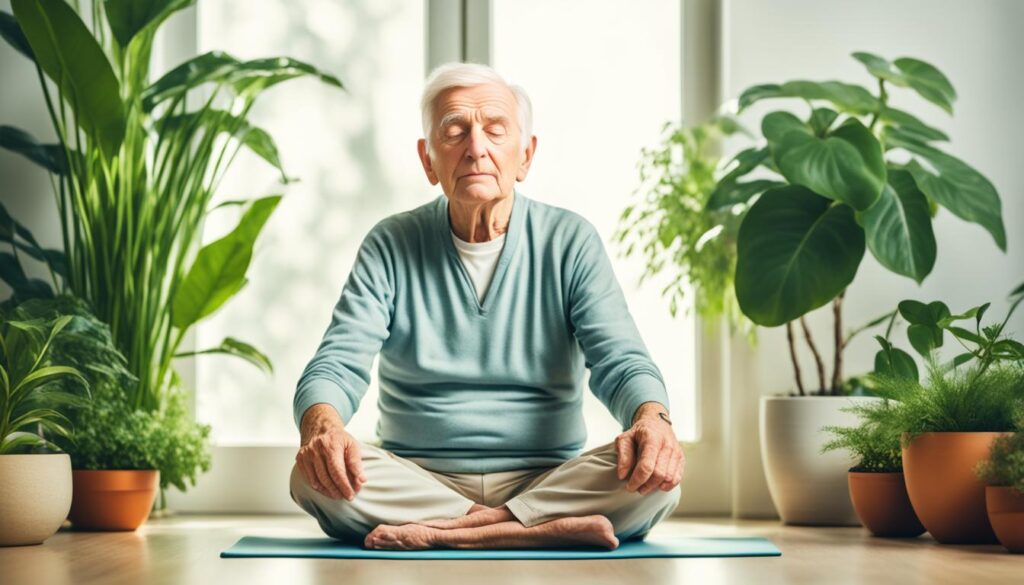mindfulness practices for graceful aging and mental clarity: The 2 Best You Need To Know
mindfulness practices for graceful aging and mental clarity: As I reflect on the journey of life and the inevitability of aging, I am reminded of the profound importance of nurturing the mind, body, and spirit. We all desire to age gracefully, with mental clarity and an inner sense of peace. In a world that often seems to prioritize productivity over presence, it is essential to explore practices that can bring us back to the present moment, allowing us to fully embrace the richness of each passing year. That is why I am excited to share with you the power of mindfulness practices in promoting graceful aging and cultivating mental clarity.
Key Takeaways:
- Mindfulness practices offer a holistic approach to nurturing the mind and body as we age
- Incorporating mindfulness techniques into your daily routine can enhance well-being
- Mindfulness can improve cognitive function, reduce stress, and increase self-awareness
- Explore different mindfulness exercises and learn how to integrate them into your daily life
- Mindfulness practices support emotional well-being and promote a positive mindset
Aging Gracefully: The Benefits of Mindfulness
As we journey through life, aging gracefully is a goal that many aspire to achieve. But what does it mean to age gracefully? It encompasses more than just physical appearance; it’s about embracing the changes and challenges that come with the passing years while maintaining a sense of inner peace and well-being.
One powerful tool that can support us on this journey is mindfulness. Mindfulness is the practice of being fully present in the moment, without judgment or attachment. It allows us to cultivate a heightened sense of self-awareness and an appreciation for the simple joys in life. But what exactly are the benefits of mindfulness when it comes to aging gracefully?
- Improving Cognitive Function: Aging may bring changes to our cognitive abilities, such as memory and attention. However, research has shown that practicing mindfulness can help enhance cognitive function and maintain mental agility as we age.
- Reducing Stress: Stress can have a profound impact on our overall well-being, both mentally and physically. By incorporating mindfulness into our daily lives, we can develop skills to manage stress more effectively, promoting a greater sense of calm and serenity.
- Increasing Self-Awareness: Mindfulness encourages us to tune into our thoughts, emotions, and physical sensations. This heightened self-awareness allows us to better understand ourselves, our needs, and our desires as we navigate the complexities of aging.
- Enhancing Emotional Resilience: As we age, we may face a range of emotions, from joy and fulfillment to grief and loss. Mindfulness practices equip us with the tools to cultivate emotional resilience, enabling us to navigate these emotions with grace and acceptance.
By engaging in regular mindfulness practices, we can create a strong foundation for aging gracefully, nurturing both our minds and bodies. Scientific studies have demonstrated the profound benefits of mindfulness for overall well-being and quality of life.
So, why not incorporate mindfulness into your daily routine? Embrace the present moment and unlock the transformative power of mindfulness to support you on your journey of graceful aging.
“Mindfulness is the key to unlocking the fullness of life. It allows us to appreciate the smallest moments and find joy in the simplest of things.”
To provide a visual representation of the benefits of mindfulness for aging gracefully, here is a table summarizing key research findings:
| Benefits of Mindfulness for Aging Gracefully | Research Findings |
|---|---|
| Improved Cognitive Function | Mindfulness practices have been shown to enhance cognitive abilities and improve memory and attention. |
| Reduced Stress | Mindfulness-based stress reduction programs have been found to significantly decrease perceived stress levels among older adults. |
| Increased Self-Awareness | Mindfulness practices promote self-awareness and self-compassion, allowing individuals to navigate the challenges of aging with greater clarity and acceptance. |
| Enhanced Emotional Resilience | Mindfulness-based interventions have been found to improve emotional well-being and resilience in older adults, reducing symptoms of depression and anxiety. |
With mindfulness as your companion, embrace the journey of aging and experience the countless benefits it brings to your mental, emotional, and physical well-being.
Understanding Mindfulness Practices
In today’s fast-paced world, finding inner peace and mental clarity can feel like an elusive goal. That’s where mindfulness practices come in. By delving into the world of mindfulness techniques, you can gain a deeper understanding of how they positively impact your mental health and overall well-being.
Mindfulness practices involve redirecting your attention to the present moment, cultivating a sense of non-judgmental awareness, and fostering a deeper connection with yourself and the world around you. These practices draw from ancient wisdom traditions, such as Buddhism, and have been adapted to suit modern lifestyles.
Exploring different mindfulness exercises can help you find techniques that resonate with you and can be easily integrated into your daily routine. Whether it’s meditation, mindful breathing, or body scan exercises, these practices offer a wide range of benefits for your mental and emotional well-being.
“Mindfulness means paying attention in a particular way: on purpose, in the present moment, and non-judgmentally.” – Jon Kabat-Zinn
Mindfulness practices can help you:
- Reduce stress and anxiety levels
- Improve focus and concentration
- Cultivate self-awareness and emotional resilience
- Enhance compassion towards yourself and others
- Promote clarity of thought and decision-making
By incorporating mindfulness into your daily life, you can experience a greater sense of calm and balance. These practices act as anchors, bringing you back to the present moment whenever your mind starts to wander. Mindfulness can be applied to various activities, such as eating, walking, and even engaging in conversations, allowing you to fully experience and appreciate each moment.
The Benefits of Mindfulness Practices
Mindfulness practices have been extensively studied and have shown numerous benefits for mental and emotional well-being. Research has demonstrated that regular mindfulness practice can:
- Reduce symptoms of depression and anxiety
- Improve cognitive function and memory
- Enhance overall life satisfaction
- Promote better sleep quality
- Improve relationships and interpersonal communication
These benefits make mindfulness an invaluable tool for individuals seeking to nurture their mental health and find a sense of peace amidst the chaos of everyday life.
Integrating Mindfulness into Your Routine
Getting started with mindfulness practices is easier than you might think. Begin by setting aside a few minutes each day to engage in a mindfulness exercise that resonates with you. It could be a simple breathing exercise where you focus on your breath or a guided meditation that helps you cultivate a sense of relaxation and awareness.
As you become more comfortable with these practices, gradually increase the duration and frequency of your sessions. The key is to be consistent and patient with yourself, as mindfulness is a lifelong journey of self-discovery and growth.
To help you get started, here’s a short mindfulness exercise you can try:
- Sit or lie down in a comfortable position.
- Close your eyes and take a deep breath in through your nose, feeling your lungs expand.
- As you exhale through your mouth, release any tension in your body and let go of any wandering thoughts.
- Bring your attention to the sensations of your body, starting from your toes and moving upward.
- Notice any areas of tension or discomfort, and gently breathe into those areas.
- Continue to observe your body and breath, allowing any thoughts or emotions to come and go without judgment.
- When you’re ready, slowly open your eyes and take a moment to reflect on your experience.
Remember, mindfulness is a practice that you can customize to suit your needs and preferences. Experiment with different techniques and find what works best for you. With regular practice, you can cultivate a greater sense of mindfulness, peace, and well-being in your life.

Cultivating Mental Clarity Through Mindfulness
In today’s fast-paced world, cultivating mental clarity becomes essential, especially as we age. Mindfulness practices offer powerful tools to sharpen our focus, improve concentration, and enhance cognitive function. By incorporating mindfulness exercises into our daily routine, we can navigate the challenges of aging with clarity and ease.
Mindfulness exercises provide a range of benefits for mental clarity. They help us become more present, aware, and attuned to our thoughts, emotions, and surroundings. By practicing mindfulness, we cultivate a state of non-judgmental awareness and learn to anchor ourselves in the present moment, free from distractions and mental clutter.
“Practicing mindfulness is like taking a pause in the chaos of life – it allows us to find stillness within, clearing the path for mental clarity and improved cognitive function.”
Here are some specific mindfulness exercises that can be particularly effective in cultivating mental clarity:
- Body Scan: Lie down or sit comfortably and bring your attention to different parts of your body, starting from your toes and moving up to your head. Notice any sensations or tension, allowing yourself to release any physical or mental stress as you scan each body part.
- Mindful Breathing: Focus your attention on your breath, feeling the sensations of inhaling and exhaling. Notice the rise and fall of your chest or the feeling of air passing through your nostrils. Whenever your mind starts to wander, gently bring your focus back to your breath.
- Walking Meditation: Take a leisurely walk, paying close attention to the experience of each step. Notice the sensations in your feet, the rhythm of your movement, and your connection with the environment around you.
- Journaling: Set aside time each day to reflect on your thoughts and emotions. Write down your observations, feelings, and any insights that arise. This practice helps bring clarity to your inner world and promotes self-reflection.
- Visualization: Close your eyes and imagine a serene and peaceful place. Use your senses to vividly visualize the surroundings, colors, and sounds. Stay in this visualization for a few minutes, allowing your mind to calm and focus.
By regularly engaging in these mindfulness exercises, you can train your mind to become more focused and attentive. Over time, you will notice improvements in your ability to concentrate, make decisions, and respond to challenges with clarity and ease.
Remember, cultivating mental clarity is an ongoing practice. Dedicate a few minutes each day to engage in mindfulness exercises and observe the transformative power they have on your mental well-being.

| Improved focus and concentration | Enhanced cognitive function | Reduced mental stress and anxiety |
|---|---|---|
| By training our attention with mindfulness, we can improve our ability to stay focused on the task at hand, leading to increased productivity and effectiveness. | Mindfulness has been shown to enhance cognitive abilities, such as memory, attention span, and information processing, promoting mental sharpness and clarity. | Regular mindfulness practices can help reduce stress and anxiety, allowing the mind to operate from a calmer state and facilitating clearer thinking and decision-making. |
Mindfulness for Emotional Well-being
As we age, emotional well-being plays a crucial role in maintaining a sense of fulfillment and balance. Mindfulness practices can serve as powerful tools to support our emotional well-being and help us navigate the challenges and joys of later life with grace and resilience.
Mindfulness techniques provide us with the ability to manage stress, enhance our resilience, and cultivate a positive mindset. By incorporating these practices into our daily lives, we can find a deep sense of emotional balance and fulfillment.
One powerful mindfulness technique for managing stress is deep breathing. By focusing on our breath and bringing attention to each inhale and exhale, we can create a state of calm and relaxation, reducing the impact of stress on our emotional well-being.
“Mindfulness is the key to unlocking a peaceful mind in the face of life’s challenges,” says Dr. Emma Thompson, a renowned mindfulness expert.
Practicing mindfulness allows us to observe our thoughts and emotions without judgment. It provides a space for us to tune into our inner wisdom and respond to situations with clarity and compassion.
Techniques for Enhancing Emotional Well-being
Here are some mindfulness techniques that can help enhance our emotional well-being:
- Body Scan Meditation: This practice involves scanning our bodies from head to toe, bringing our attention to each body part and noticing any sensations or areas of tension. It helps us cultivate a deeper connection with our bodies, promoting self-awareness and offering insights into emotional well-being.
- Gratitude Journaling: Taking the time each day to write down three things we are grateful for fosters a positive mindset and boosts our emotional well-being. It encourages us to appreciate the present moment and shifts our focus towards gratitude.
- Loving-Kindness Meditation: This practice involves sending well-wishes and compassion to ourselves and others. By cultivating feelings of kindness and compassion, we can develop a more positive outlook on life and enhance our emotional well-being.
By incorporating these mindfulness techniques into our lives, we can create a strong foundation for emotional well-being as we age.

| Emotional Well-being | Mindfulness Techniques |
|---|---|
| Stress management | Deep breathing, body scan meditation |
| Positive mindset | Gratitude journaling, loving-kindness meditation |
| Self-awareness | Body scan meditation |
Enhancing Physical Health Through Mindfulness
When it comes to overall well-being, physical health plays a vital role. Incorporating mindfulness techniques into your daily routine can have a profound impact on your physical well-being, promoting healthy aging and fostering a stronger mind-body connection. Mindfulness practices not only enhance your mental clarity but also contribute to maintaining optimal physical health as you age.
One of the ways mindfulness promotes physical health is by reducing stress. Chronic stress can have detrimental effects on the body, leading to various health issues. Mindfulness techniques, such as deep breathing exercises and body scans, help activate the body’s relaxation response, reducing stress levels and enhancing overall resilience.
Additionally, mindfulness can boost immune function, which is essential for maintaining good health. By reducing stress and promoting a sense of well-being, mindfulness practices directly influence our immune system, enhancing its ability to defend against illnesses and infections.

Moreover, mindfulness encourages us to listen to our bodies and honor their needs. By practicing mindful eating, for example, we can foster a healthier relationship with food and make choices that nourish our bodies. Mindful movement, such as yoga or tai chi, not only improves flexibility and strength but also helps us connect with our bodies on a deeper level.
“Mindfulness is the key to unlocking the potential of our physical health. By being fully present in the moment, we can nurture our bodies and cultivate a deeper understanding of our physical well-being.”
Furthermore, mindfulness practices can improve sleep quality, which is crucial for overall physical health. Engaging in mindfulness techniques before bedtime, such as guided meditation or progressive muscle relaxation, can help calm the mind and promote a more restful night’s sleep.
Let’s explore a table that summarizes the physical health benefits of mindfulness techniques:
| Physical Health Benefits of Mindfulness |
|---|
| Reduces stress levels |
| Enhances immune function |
| Promotes healthy eating habits |
| Improves flexibility and strength through mindful movement |
| Improves sleep quality |
As you can see, incorporating mindfulness techniques into your daily life can have significant benefits for your physical health. By nurturing the mind-body connection and promoting overall well-being, mindfulness practices empower you to navigate the aging process with vitality and resilience.
Mindfulness in Daily Life
Integrating mindfulness practices into your daily life can have a profound impact on your overall well-being and inner calm. By cultivating present moment awareness and incorporating mindfulness exercises into your routine, you can experience a greater sense of clarity and mental clarity. Here are some practical ways to embrace mindfulness in your everyday activities:
Mindful Eating
Instead of rushing through meals, take the time to savor each bite mindfully. Pay attention to the flavors, textures, and sensations of the food as you eat. Practice gratitude for the nourishment your meal provides, and be fully present in the experience of nourishing your body.
Mindfulness in Movement
Engage in physical activities with a mindful approach. Whether it’s walking, yoga, or any other form of exercise, be aware of each movement, sensation, and breath. Use this time to focus on the present moment and connect with your body, allowing stress and worries to fade away.
“Mindfulness is the key to unlocking the fullness of life. It helps us cultivate a deep appreciation for the simple moments and find peace in the midst of chaos.”
Creating Mindful Rituals
Designate specific times of the day for mindfulness rituals. It could be a morning meditation, an afternoon gratitude practice, or an evening journaling session. Establishing these rituals helps anchor your mind in the present moment and creates a sense of calm and centeredness throughout the day.
Mindful Communication
Practice active listening and being fully present in your conversations. Give your undivided attention to the person speaking, without judgment or distraction. Mindful communication fosters deeper connections, understanding, and empathy.

Mindful Rest
Make time for relaxation and self-care. Engage in activities that bring you joy and help you unwind, such as reading, taking baths, or practicing mindfulness meditation. Dedicate moments to simply be still and embrace the present, allowing your mind and body to rejuvenate.
By incorporating mindfulness into your daily life, you can infuse every moment with a sense of presence and awareness. These simple practices can enhance your overall well-being, promote mental clarity, and foster a deeper connection with yourself and the world around you.
Mindful Aging: Embracing the Journey
As I embrace the concept of mindful aging, I have come to understand the transformative power of mindfulness techniques in shifting my perspective on growing older. Through the practice of mindfulness, I have discovered a wealth of techniques that allow me to navigate the aging process with grace and wisdom.
One of the key techniques for embracing change is cultivating awareness in the present moment. Mindfulness has taught me to appreciate the beauty of life’s transitions, embracing the ebb and flow of time with an open heart. By acknowledging and accepting change, I have found a renewed sense of purpose and fulfillment in my journey of aging.
Maintaining a positive outlook is another crucial aspect of mindful aging. By focusing on the present moment and reframing negative thoughts, I am able to nurture a sense of optimism and resilience. This positive mindset empowers me to face challenges with confidence and to cherish the joys that each day brings.
“Gratitude unlocks the fullness of life. It turns what we have into enough, and more. It turns denial into acceptance, chaos into order, confusion into clarity. It can turn a meal into a feast, a house into a home, a stranger into a friend.”
– Melody Beattie
Mindfulness has also taught me the importance of finding gratitude in the present moment. By cultivating an attitude of gratitude, I am able to shift my focus from what I may have lost or what I may fear in the future, and instead appreciate the richness and abundance that surrounds me. This shift in perspective brings a profound sense of contentment and fulfillment, enhancing my experience of aging.

Mindfulness Retreats and Resources
If you’re looking to deepen your mindfulness practice and embark on a transformative journey, consider exploring mindfulness retreats and resources tailored specifically for aging individuals. These retreats and resources provide an immersive and supportive environment where you can learn and practice mindfulness techniques for graceful aging.
There are various workshops, online courses, and retreats available that focus on mindfulness practices for seniors. These programs offer valuable guidance, techniques, and teachings to help you enhance your mindfulness practice and navigate the challenges and joys of aging with grace and mindfulness.
Workshops: Exploring Mindfulness in a Group Setting
Attending a mindfulness workshop allows you to connect with like-minded individuals and dive deeper into mindfulness techniques under the guidance of experienced facilitators. These workshops often include group discussions, guided meditations, and interactive exercises that foster a sense of community and shared learning.
Online Courses: Learning at Your Own Pace
If you prefer the flexibility of learning from the comfort of your own home, consider enrolling in an online mindfulness course. These courses provide a structured curriculum, accessible resources, and guided meditations that you can engage with at your own pace. With online courses, you have the freedom to tailor the learning experience to your individual needs and schedule.
Retreats: Deepening Your Practice in a Tranquil Setting
Immerse yourself in the beauty of nature and the serenity of a retreat center by attending a mindfulness retreat for seniors. These retreats offer a peaceful and rejuvenating environment where you can disconnect from the distractions of everyday life and fully immerse yourself in mindfulness practices. Retreats typically include daily meditation sessions, mindfulness workshops, and opportunities for self-reflection and contemplation.
No matter which option you choose, mindfulness retreats and resources provide a valuable opportunity to deepen your practice, gain insights from experienced teachers, and connect with a community of individuals who share your commitment to mindfulness and graceful aging.

Incorporating Mindfulness into Your Golden Years
As we enter our golden years, prioritizing mental health becomes increasingly important. Mindfulness practices offer a powerful tool for promoting overall well-being and nurturing a sense of inner peace during this transformative stage of life. By incorporating mindfulness into your daily routine, you can enhance mental health, cultivate emotional resilience, and embrace the joys of aging with grace.
Here are some practical tips to help you make mindfulness a natural part of your golden years:
1. Start with Mindful Breathing
Begin your mindfulness journey by focusing on your breath. Take a few moments each day to sit quietly and pay attention to your breath as it flows in and out. This simple practice can help calm the mind, reduce stress, and promote relaxation.
2. Practice Mindful Movement
Engage in mindful movement exercises such as yoga or tai chi. These practices combine physical activity with mindful awareness, allowing you to cultivate a deeper connection between the body and mind. Explore gentle movements that promote flexibility, balance, and overall strength.
3. Embrace Mindful Eating
Slow down and savor each bite during meals. Pay attention to the flavors, textures, and sensations as you eat. Mindful eating promotes a healthier relationship with food, enhances digestion, and helps you make conscious choices that nourish your body.
4. Create Mindful Rituals
Incorporate mindful rituals into your daily life. Whether it’s a morning gratitude practice, a mindful walk in nature, or setting aside time for reflection, these rituals can bring a sense of groundedness and presence to your day.
5. Connect with a Mindfulness Community
Join a local mindfulness group or community that shares your interest in nurturing mental health through mindfulness. Engaging with like-minded individuals can provide support, encouragement, and opportunities for learning and growth.
By incorporating these mindfulness practices into your golden years, you can enhance mental health, promote overall well-being, and nurture a deep sense of inner peace. Embrace the transformative power of mindfulness and embark on a journey of self-discovery and self-care during this special stage of life.

Conclusion
In conclusion, mindfulness practices have the potential to enhance the aging process by promoting graceful aging and mental clarity. By incorporating mindfulness techniques into your daily life, you can cultivate emotional well-being, maintain physical health, and embrace the journey of aging with mindfulness and resilience.
Embracing the power of mindfulness allows you to navigate the challenges of aging with grace and wisdom. By cultivating present moment awareness and inner calm, you can foster a greater sense of peace and fulfillment during your golden years.
Remember, mindfulness is not something you achieve overnight. It is a continuous practice that requires patience and dedication. Start small, make mindfulness a natural part of your daily routine, and watch as it transforms your mental and physical well-being. Embrace the power of mindfulness and nurture your well-being as you navigate your golden years.
FAQ
What are mindfulness practices?
Mindfulness practices are techniques that involve paying attention to the present moment with non-judgmental awareness. These practices can include meditation, deep breathing exercises, and sensory awareness exercises.
How can mindfulness practices promote graceful aging?
Mindfulness practices promote graceful aging by reducing stress, enhancing emotional well-being, and increasing self-awareness. They can also improve cognitive function, promote physical health, and help individuals navigate the challenges of aging with clarity and ease.
What are the benefits of mindfulness for aging gracefully?
The benefits of mindfulness for aging gracefully include improved cognitive function, reduced stress and anxiety, increased self-awareness, enhanced emotional well-being, and a stronger mind-body connection. Mindfulness practices offer a holistic approach to nurturing the mind and body as we age.
How can mindfulness exercises enhance mental clarity?
Mindfulness exercises can enhance mental clarity by sharpening focus, improving concentration, and enhancing cognitive function. By practicing mindfulness, individuals can cultivate a sense of calm and clarity within their minds, allowing them to navigate the challenges of aging with greater mental clarity.
Can mindfulness practices support emotional well-being as you age?
Yes, mindfulness practices can support emotional well-being as you age. They can help manage stress, enhance resilience, promote a positive mindset, and cultivate emotional balance. Mindfulness techniques empower individuals to embrace the later years of life with a greater sense of emotional well-being and fulfillment.
What is the connection between mindfulness and physical health?
There is a strong connection between mindfulness practices and physical health. Mindfulness can promote healthy aging, enhance immune function, and facilitate a stronger mind-body connection. By practicing mindfulness, individuals can maintain optimal physical well-being as they age.
How can mindfulness be incorporated into daily life?
Mindfulness can be incorporated into daily life through various practices such as mindful eating, mindfulness in movement, and mindful breathing. By cultivating present moment awareness and inner calm, individuals can seamlessly integrate mindfulness into their routines, fostering greater well-being.
How can mindfulness practices help embrace the journey of aging?
Mindfulness practices can help embrace the journey of aging by shifting perspectives on growing older, maintaining a positive outlook, and finding gratitude in the present moment. By practicing mindfulness, individuals can navigate the aging process with grace and wisdom.
Are there mindfulness retreats and resources for aging individuals?
Yes, there are mindfulness retreats, workshops, online courses, and resources specifically designed for aging individuals. These provide opportunities to deepen mindfulness practice and receive further support and guidance on the journey of graceful aging.
How can mindfulness be incorporated into the golden years?
Mindfulness can be incorporated into the golden years by making it a natural part of daily routines. By practicing mindfulness exercises and techniques regularly, individuals can enhance mental health, promote overall well-being, and nurture a sense of inner peace during this transformative stage of life.







